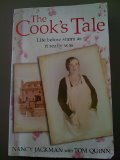The Cook’s Tale, Life below stairs as it really was, by Nancy Jackman, is the real story of a woman who was born in an English village in 1907. Nancy grew up to be a kitchen maid and then a cook.
Nancy was an only child who was obviously very deeply loved, who grew up knowing that the day would come when she would have to go out to work in order to contribute to her family’s income. When Nancy was twelve that day came, and she went to work for a neighbouring farmer. Eventually the farmer began to take an inappropriate interest in her.
Nancy left the farmer’s employ, and went to work in a household where the cook took her under her wing, and taught her to keep a recipe book of her own. Eventually the cook the sack in an attempt by their employers to save money and Nancy took the cook’s place.
Nancy left this family after a run in with the lady of the house and went to work for another family, where she worked for many years. Nancy worked for the same family throughout WW2, cooking food which had been obtained by her employers through the black market. While in this household Nancy made friends with Dolly, the kitchen maid and they worked together for many years. During this time Nancy also had her first and only romance with a police officer named Charlie, who died during the war.
Nancy’s story of lead being deposited in the toilet bowls after the upstairs members of the household ate game birds was interesting and so were her stories of foods considered prestigious, which she thought revolting. Nancy didn’t describe herself as an adventurer by any means.
Nancy eventually left the household to escape the clutches of a conman, who she had previously given money too. Nancy comes across as quite naïve in many ways. She explains quite a few times that she was not a pretty woman and that she never had the opportunity for romance until she was in her thirties, when she met Charlie. The times were certainly changing, but Nancy was limited by her education and experiences from being able to see more of the world, however her life long dream was to own a home of her own and she achieved this. It was hard to understand why Nancy didn’t go to the police for assistance, but instead she moved to London, without telling anyone where she was going.
When Nancy moved to London, for the first time in her life she chose to board in a separate household to that of the family she was working for. Nancy’s landlady was elderly and a recluse, who unexpectedly died and left Nancy her home very soon after Nancy moved in.
Nancy continued to work as a cook, despite her windfall. Later Dolly turned up on Nancy’s doorstep and they lived together until Dolly’s death.
I found this book a little dull, but as I read it on holidays that didn’t worry me much. I would have liked to have read some of Nancy’s recipes though, as most books can be livened up with a recipe or two. Nancy’s stories are from a time which has gone forever. The book certainly gave me food for thought though, in that I recognise how lucky women are now to have the opportunities we have.
